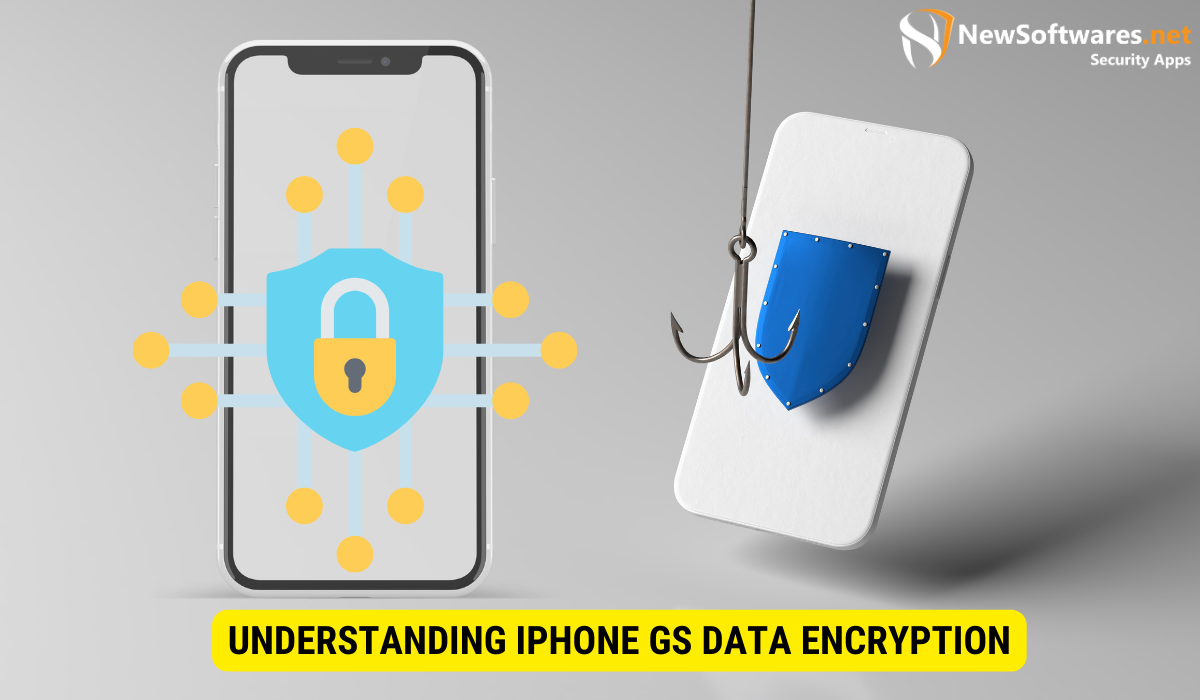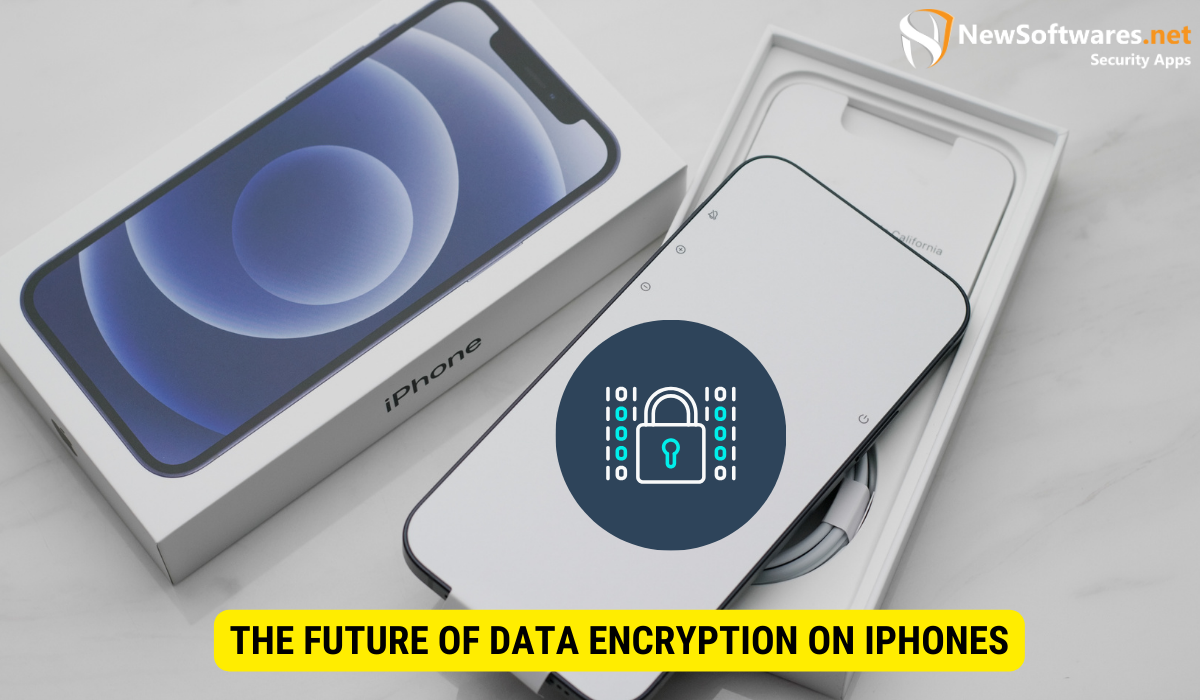Discover how iPhone GS data encryption works, its strengths, potential weaknesses, and comparisons with other smartphones. Learn how to enhance your data security on your iPhone GS.
Data security is a top concern for individuals and businesses in today’s digital age. With the widespread use of smartphones and their constant connectivity, ensuring the security of our personal and sensitive information has become more important than ever. The iPhone GS, Apple’s flagship smartphone, boasts advanced data encryption features to protect your data from prying eyes. Together, we will dive deep into iPhone GS data encryption, understand how it works, evaluate its strengths and weaknesses, compare it to other smartphones, and explore ways to enhance your iPhone GS data security.
Understanding iPhone GS Data Encryption

Data encryption transforms data into a code that can only be accessed or decrypted by authorized individuals or devices. In the case of the iPhone GS, data encryption is a critical component of its security architecture. Understanding the basics of data encryption is essential in comprehending how the iPhone GS protects your data.
The Basics of Data Encryption
Data encryption relies on complex algorithms to scramble data to render it unreadable without the proper decryption password. This ensure that even if a malicious actor gains unauthorized access to your iPhone GS, they would not be able to decipher any sensitive information stored on the device.
Modern encryption techniques use two types of keys to encrypt and decrypt data: for example symmetric and asymmetric encryption. Symmetric encryption, as the name suggests, uses the same secret key for encryption & decryption. This key must be firmly shared between the sender and the intended recipient to ensure the confidentiality and integrity of the encrypted data. On the other hand, asymmetric encryption uses a pair of keys: one public & one private. The public key is used to encrypt data, while the private key is used for decryption. This provides an additional layer of security, as the private key is kept secret and not shared with others.
How iPhone GS Implements Data Encryption
Apple has implemented robust data encryption mechanisms in the iPhone GS to safeguard user data. The device utilizes a unique encryption chip, the Secure Enclave, which is responsible for storing encryption keys and performing encryption and decryption operations.
One of the key features of iPhone GS data encryption is full-disk encryption. All data stored on the device, including the operating system, apps, and user data, is automatically encrypted using secure algorithms. When a user sets a passcode on their iPhone GS, it acts as the encryption key, ensuring that the data stored on the device is only accessible when the correct passcode is entered.
In addition to full-disk encryption, the iPhone GS also supports file-level encryption. This means individual files and documents can be encrypted independently, providing an extra layer of security for sensitive information.
Evaluating the Security of iPhone GS Data Encryption
Now that we better understand how iPhone GS data encryption works, let’s evaluate its security features and its strengths and weaknesses.
Strengths of iPhone’s Encryption
The iPhone GS boasts several key strengths when it comes to data encryption. One of the standout features is the hardware-based encryption through the Secure Enclave chip. By using specialized hardware, Apple can provide a higher security level than software-based encryption solutions. This makes it significantly more difficult for attackers to gain unauthorized access to encrypted data.
Furthermore, the use of full-disk encryption ensures that all data on the iPhone GS is protected, regardless of its location. This means that even if an attacker physically removes the storage chip from the device, they cannot retrieve any readable information without the encryption key.
Potential Weaknesses and Vulnerabilities
While the iPhone GS data encryption offers robust security, it has potential weaknesses and vulnerabilities. One potential vulnerability lies in the passcode that unlocks the device and decrypts the data. If a user chooses a weak or easily guessable passcode, it significantly reduces the effectiveness of the encryption. Users must select strong, unique passcodes that are not easily guessable by others.
Another potential weakness is the possibility of security breaches or software vulnerabilities that could expose encryption keys or bypass the encryption altogether. Although Apple has a strong track record in addressing security vulnerabilities promptly, users need to keep their devices updated with the most recent protection patches and software updates.
Comparing iPhone GS Data Encryption with Other Smartphones
While the iPhone GS is renowned for its focus on security, it is worth comparing its data encryption capabilities with other leading smartphone brands.
Android vs iPhone GS: A Data Encryption Perspective
Android, another popular smartphone operating system, also offers data encryption features to protect user information. However, there are significant differences in how encryption is implemented on Android devices compared to the iPhone GS.
Unlike the iPhone GS, where data encryption is enabled by default, Android devices require the user to manually enable encryption. This means that their data remains vulnerable if a user does not enable encryption on their Android device.
Furthermore, the encryption process on Android devices can be more time-consuming than on the iPhone GS, potentially resulting in longer device startup times.
How Other Smartphone Brands Stack Up
While the iPhone GS and Android dominate the smartphone market, other smartphone brands also offer data encryption features. These brands often implement encryption techniques similar to those found in the iPhone GS, providing users with options to secure their data. However, it is important to note that the degree of security offered may vary between different smartphone brands.
Enhancing Your iPhone GS Data Security
While the iPhone GS already provides robust data encryption features, there are additional steps you can take to enhance the security of your data.
Best Practices for Secure Data Management
Practicing good data management habits can go a long way in ensuring the security of your iPhone GS. Some best practices include:
- Regularly backing up your data to a secure location, such as iCloud or a trusted computer.
- Enabling two-factor authentication for your Apple ID add an additional safety layer to your device and iCloud data.
- Avoid using untrusted Wi-Fi networks, which can expose your data to eavesdropping or interception.
- Use strong, sole passwords for all your online accounts and enable password autofill features.
- Be cautious when installing third-party apps and only downloading them from trusted sources.
Additional Security Features to Consider
In addition to data encryption, the iPhone GS offers several other security features that can further enhance the protection of your data. Some notable features include:
- Face ID or Touch ID authentication: Utilizing biometric data, these features ensure that only authorized individuals can access your device and encrypted data.
- Find My iPhone: This feature allows you to distantly track, lock, and erase your iPhone GS in case it is lost or stolen, protecting your data from falling into the wrong hands.
- App privacy permissions: The iPhone GS grants you rough control over which apps can access your data, allowing you to manage privacy settings and minimize the risk of unauthorized data sharing.
The Future of Data Encryption on iPhones

As technology continues to evolve, so do the methods and techniques used for data encryption. Apple is committed to ensuring the ongoing security of its devices and regularly releases security updates to address potential vulnerabilities.
Upcoming Security Updates
Apple’s dedication to data security means iPhone users can expect regular security updates addressing any identified weaknesses or vulnerabilities. These updates help strengthen the overall security of iPhone GS data encryption, ensuring that user information remains safe.
The Role of Encryption in Future iPhone Models
With each new iPhone model, Apple strives to enhance its security features and capabilities, including data encryption. While details about future encryption enhancements remain undisclosed, Apple will likely continue to prioritize data security and implement stronger encryption measures to protect user data.
Key Takeaways
- The iPhone GS utilizes advanced data encryption techniques to protect user data, including full-disk and file-level encryption.
- Hardware-based encryption through the Secure Enclave chip provides a higher security level than software-based solutions.
- While the iPhone GS offers robust data security, users must select strong passcodes and update their devices to mitigate potential weaknesses.
- Comparing the data encryption features of the iPhone GS with other smartphones, it stands out for its default encryption and secure hardware.
- Enhancing iPhone GS data security can be achieved through best practices, such as regular backups and strong password management, and utilizing additional security features like biometric authentication and app privacy settings.
FAQs
Can I disable the data encryption on my iPhone GS?
No, the data encryption on the iPhone GS is an integral part of its security architecture and cannot be disabled. It provides a crucial layer of safety for your personal and sensitive information.
What happens if I forget my iPhone GS passcode?
If you forget your iPhone GS passcode, it can be tough to regain access to the device and your encrypted data. Apple provides several methods to recover your device, such as using your Apple ID or restoring the device to factory settings. However, remember that these processes may result in the loss of any data that is not backed up.
Are my iCloud backups encrypted?
Yes, iCloud backups for iPhone GS devices are encrypted to make sure the security and privacy of your data. The data stored in your iCloud backups is protected using techniques similar to those used for on-device data encryption.
Can I use third-party encryption software on my iPhone GS?
Apple discourages using third-party encryption software on iPhones, as it can interfere with the device’s built-in security measures. It is recommended to rely on the native data encryption capabilities the iPhone GS provides.
Is the data encryption on the iPhone GS hack-proof?
No data encryption method is entirely hack-proof, as new vulnerabilities and attack techniques may emerge. However, the iPhone GS data encryption, coupled with regular security updates from Apple, provides a robust level of security that makes it significantly challenging for attackers to access encrypted data.
Conclusion
When it comes to data security, the iPhone GS stands out as a leader in the smartphone market. Its advanced data encryption features, including full-disk and file-level encryption, provide users with high protection for their personal and sensitive information. While there may be potential weaknesses and vulnerabilities, Apple’s continuous commitment to security updates and ongoing enhancements ensures that user data remains secure.
By implementing best practices for secure data management and utilizing additional security features provided by the iPhone GS, users can further enhance their data protection. As technology progresses, it is safe to assume that data encryption will play a crucial role in future iPhone models and the overall security landscape.
